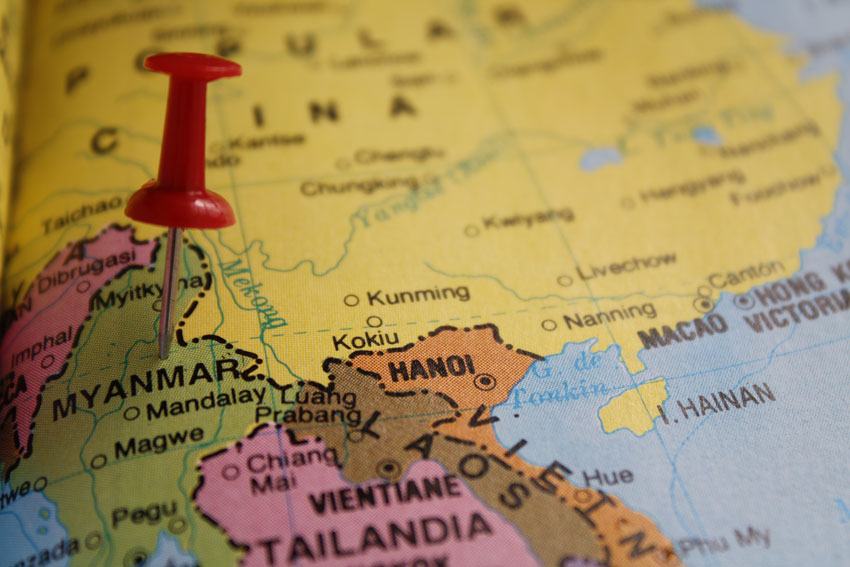Myanmar’s political history is littered with violent military coups. On February 1, 2021, Senior General Min Aung Hlaing took control of Myanmar and restored a nascent democracy to a violent dictatorship. This is the third time in Myanmar’s post-independence history that the military has taken control of the country, 59 years after the first coup led by General Ne Win and 32 years after the second coup ordered by SLORC. Although the country’s history is full of brutal military regimes, it is also full of popular revolutions against military rule, the most prominent of which are the 8888 Uprising, the Saffron Revolution, and the current Spring Revolution.
The Spring Revolution was different from previous revolutions in that it was the most sustained anti-military political movement in the country’s history. While both the 8888 Uprising and the Saffron Revolution lasted only a few months, the Spring Revolution continued to gain momentum in 2024, more than three years after the most recent coup. Protracted conflicts continue across the country. As of April 26, 2024, 4,946 civilians have been murdered by the regime and 26,573 have been arrested. Despite a violent crackdown, millions of people took to the streets to protest the military takeover. The ongoing Spring Revolution encompasses different actors and initiatives, including but not limited to the Civil Disobedience Movement (CDM), Frontline Protests, the National Unity Government (NUG) and the People’s Defense Forces (PDF).
To strengthen cooperation between the different branches of the Spring Revolution, pro-democracy activists have increasingly relied on social media. For women in particular, social media has become a powerful space for expressing political views and organizing against the military regime. In response to growing online resistance, the military government has implemented harsh digital repression measures and actively persecuted civilians who support the opposition online. Online violence against pro-democracy activists often translates into offline violence such as arrests and sexual violence. The Myanmar military’s digital repression is highly gendered, as female activists experience gender-based violence and persecution at significantly higher rates than their male counterparts.
Authoritarian actions and responses to online dissent in Myanmar can be divided into five categories: internet shutdowns, online censorship, surveillance, targeted persecution of internet users, and social media manipulation and disinformation. However, in addition to these five categories, female online activists in Myanmar also face specific forms of gender-based violence. Some examples of this type of gender-based violence include doxxing, abusive messages with sexist language, non-consensual disclosure of intimate videos and images, sexualized false information, threats of sexual violence, rape threats and death threats. Different forms of sexual repression can cause the most severe physical and psychological trauma, as these repressive tactics subject female online activists and their families to social stigma. Gender-based online violence against democratic women is overwhelmingly perpetrated by men.
Myanmar women who express political views on social media are subject to doxxing at a much higher rate than men who are politically active online. Doxxing is particularly a gendered digital repression tactic in Myanmar, as many female activists who have been doxxed by pro-military and male social media figures such as Han Nyein Oo and Ba Nyunt have been arrested by security forces. The arrest also raises the additional risk of more gender-based violence against women, as the Myanmar military systematically rapes women and girls on a mass scale.
The gendered nature of Myanmar’s military junta’s digital repression is worrying, as online violence against women becomes a significant barrier to their meaningful political participation. According to Freedom House’s 2023 Internet Freedom Report, Myanmar is one of the most digitally repressive regimes in the world, second only to China. With political support from Russia and China and equipped with international surveillance technology, the Myanmar regime is committing crimes against humanity against individuals who speak out against military rule on social media. Women bear the brunt of this targeted digital oppression simply because of their gender.
The case of Myanmar highlights how autocrats use social media as a political tool, not only reacting to but actively blocking women’s online activity. Myanmar’s military’s online repression tactics could attract other authoritarian governments to crack down on feminist dissent in their own countries. This bleak potential, if realized, could further weaken the rights of women in different authoritarian regimes at alarming rates. Therefore, it is not enough for the international community to condemn Myanmar’s gender digital suppression through statements and press releases. International stakeholders need to work with Myanmar civil society to provide women with robust digital security training so that they can continue to fight for democracy through safer, more creative and disruptive forms of digital action.
Further reading on electronic international relations

